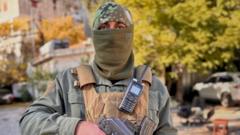Residents of Latakia, particularly the Alawite community, grapple with fear and disillusionment as new power dynamics emerge in the city following the regime change.
Lost Trust: Alawite Fears in Post-Assad Latakia

Lost Trust: Alawite Fears in Post-Assad Latakia
As HTS assumes control, Alawites face uncertainty in their homeland
In the cool afternoon light of Latakia, Noor, a terrified Alawite woman in a thick winter coat, stands shaky as she recounts her ordeal to armed men of Hayat Tahrir al-Sham (HTS), the newly established rulers of the region. Three days prior, armed militants arrived in a black van, forcing her and her family, including her husband and children, out of their home in the upscale neighborhood. In their place, the militants moved their own family into Noor's residence.
Latakia, nestled along Syria’s northwestern Mediterranean coast, is the heartland of the Alawite community, which historically has been closely associated with the Assad regime. While Alawites make up about ten percent of Syria’s predominantly Sunni population, the recent power shift has left this minority group apprehensive of coming retribution for years of regime support.
Confronted at the general security station, Noor presents CCTV footage of the armed men who broke into her apartment. HTS general security commander, Abu Ayoub, listens intently as she describes the incident—ten militants at her door and another sixteen waiting nearby. The commander, representing an entity that was once an enemy of the state, now finds himself maintaining law and order in a city recently liberated from the Assad regime.
The former military intelligence headquarters, now a messy center for grievances, sees a steady stream of residents sharing their misfortunes. Another complainant, visibly injured, describes how armed men invaded his home, physically assaulting his family and stealing valuables. As Abu Ayoub conducts his security efforts, tensions simmer on the streets.
Despite HTS’s commitment to uphold the rights of all religious groups, fears linger among the Alawite populace. With the upheaval in leadership, many residents remain confined to their homes, haunted by the specter of a reckoning for their allegiance to the old regime. Abu Ayoub concedes that chaos stalks the city, but he assures Noor and others that they will address their grievances.
The atmosphere around Latakia remains charged. While celebratory crowds once waved new Syrian flags in the streets, the Alawite neighborhoods remain largely silent, their inhabitants cautious of the changes brought forth by HTS. In a recent conflict outside the city, HTS fighters faced gunfire from criminal elements, underscoring the turbulent landscape.
As Noor retrieves her belongings from the apartment that once was her home, she recognizes the persistent undercurrent of fear. “Their presence was intimidating,” she admits, despite their cordial demeanor. Although she finds a sense of reassurance in HTS’s promises, she knows the specter of distrust looms large. "There is hope, but not in the near future," she asserts.
Amidst the fear and fragmentation, the Alawite community struggles to navigate an uncertain future, haunted by memories of oppression yet hoping for a semblance of stability in the new order of Syria.
Latakia, nestled along Syria’s northwestern Mediterranean coast, is the heartland of the Alawite community, which historically has been closely associated with the Assad regime. While Alawites make up about ten percent of Syria’s predominantly Sunni population, the recent power shift has left this minority group apprehensive of coming retribution for years of regime support.
Confronted at the general security station, Noor presents CCTV footage of the armed men who broke into her apartment. HTS general security commander, Abu Ayoub, listens intently as she describes the incident—ten militants at her door and another sixteen waiting nearby. The commander, representing an entity that was once an enemy of the state, now finds himself maintaining law and order in a city recently liberated from the Assad regime.
The former military intelligence headquarters, now a messy center for grievances, sees a steady stream of residents sharing their misfortunes. Another complainant, visibly injured, describes how armed men invaded his home, physically assaulting his family and stealing valuables. As Abu Ayoub conducts his security efforts, tensions simmer on the streets.
Despite HTS’s commitment to uphold the rights of all religious groups, fears linger among the Alawite populace. With the upheaval in leadership, many residents remain confined to their homes, haunted by the specter of a reckoning for their allegiance to the old regime. Abu Ayoub concedes that chaos stalks the city, but he assures Noor and others that they will address their grievances.
The atmosphere around Latakia remains charged. While celebratory crowds once waved new Syrian flags in the streets, the Alawite neighborhoods remain largely silent, their inhabitants cautious of the changes brought forth by HTS. In a recent conflict outside the city, HTS fighters faced gunfire from criminal elements, underscoring the turbulent landscape.
As Noor retrieves her belongings from the apartment that once was her home, she recognizes the persistent undercurrent of fear. “Their presence was intimidating,” she admits, despite their cordial demeanor. Although she finds a sense of reassurance in HTS’s promises, she knows the specter of distrust looms large. "There is hope, but not in the near future," she asserts.
Amidst the fear and fragmentation, the Alawite community struggles to navigate an uncertain future, haunted by memories of oppression yet hoping for a semblance of stability in the new order of Syria.





















